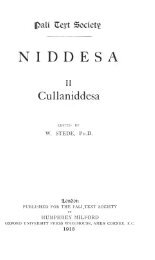Lessons In Practical Buddhism - Sirimangalo.Org
Lessons In Practical Buddhism - Sirimangalo.Org
Lessons In Practical Buddhism - Sirimangalo.Org
Create successful ePaper yourself
Turn your PDF publications into a flip-book with our unique Google optimized e-Paper software.
someone to believe in the benefit of something that leads<br />
clearly to their own detriment. Surely our intelligence itself<br />
plays a part in the problem. There is no other race on Earth<br />
so capable of acting to its own detriment as the human race,<br />
and yet we are unquestionably the most intelligent, most<br />
advanced race on Earth. As far as I know, no other species<br />
on Earth is afflicted with the kinds of stress, anxiety,<br />
depression, cruelty, despair, or self-hatred that human<br />
beings are capable of as a matter of course.<br />
The theory proposed, however, as to why we are prone to<br />
develop such errant habits and tendencies is founded on a<br />
behavioural pattern we share in common with our less<br />
intelligent animal friends. It is understood to be, in purely<br />
evolutionary terms, against our best interest to investigate<br />
thoroughly every experience we encounter. For example,<br />
when one hears a rustling sound while walking in a field of<br />
tall grass, the best response is clearly not to take the time to<br />
investigate, lest one risk becoming a meal for a hungry<br />
predator. Much safer is simply believing there to be a<br />
predator and running away; no harm will come if one is<br />
mistaken. The unfortunate side effect of this wise-seeming<br />
precaution is that it becomes a cornerstone to our outlook on<br />
life - that problems are not meant to be understood, but<br />
merely "solved" by whatever means possible.<br />
Evolution measures success based on proliferation. The<br />
habits and tendencies that allow a species to flourish are<br />
those that will be favoured and passed on. Unfortunately,<br />
such habits do not always happen to be those in the best<br />
interest of the individuals making up the species;<br />
behavioural patterns such as sexism, tribalism, colonialism,<br />
xenophobia, and, of course, religious views and beliefs tend<br />
to proliferate more successfully than their more humane /<br />
rational counterparts.<br />
The idea that religious belief may be of evolutionary benefit<br />
or detriment is not hard to understand, nor is it<br />
undocumented; the <strong>In</strong>do-Ariyan people who conquered <strong>In</strong>dia<br />
in the time before the Buddha, for example, had a<br />
well-established religious tradition that well-suited their<br />
war-like nature. Their inclination towards conflict was most<br />
certainly supportive of their conquest over the relatively<br />
132












